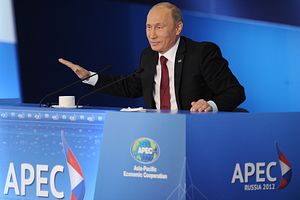Last month, The New York Times reported that in the wake of the Ukraine Crisis, U.S. President Barack Obama had decided to abandon the reset with Russia in favor of a policy of containment 2.0. According to the report:
“Just as the United States resolved in the aftermath of World War II to counter the Soviet Union and its global ambitions, Mr. Obama is focused on isolating President Vladimir V. Putin’s Russia by cutting off its economic and political ties to the outside world, limiting its expansionist ambitions in its own neighborhood and effectively making it a pariah state.
“Mr. Obama has concluded that even if there is a resolution to the current standoff over Crimea and eastern Ukraine, he will never have a constructive relationship with Mr. Putin, aides said. As a result, Mr. Obama will spend his final two and a half years in office trying to minimize the disruption Mr. Putin can cause, preserve whatever marginal cooperation can be saved and otherwise ignore the master of the Kremlin in favor of other foreign policy areas where progress remains possible.”
Given Russia’s intransigence, it’s completely understandable that Obama would be tempted to pursue this approach. It’s also a mistake. Instead of containing Russia completely, the U.S. should block its ambitions in Europe while encouraging it to turn eastward towards Asia.
Despite the hopes of many in the post-Cold War era, the U.S. and Russia are not going to have compatible interests in Eastern Europe anytime soon. Russia will always see this as its natural domain, which is a status that the U.S. is unwilling to grant Moscow, especially since NATO’s expansion over the past two decades. On the other hand, as John Allen Gay recently noted, American and Russian interests are almost perfectly compatible throughout Asia. It is in this region that the strategic rationale of the reset was always on the firmest ground.
The challenge is forcing Russia to turn eastward. Europe’s dynamism throughout the modern era has forced the Russian state to adopt a westward orientation. This is reflected in the country’s geography — with most of the major cities being located in western Russia — and deeply ingrained in Moscow’s strategic culture.
Over the long-term, it’s nearly inevitable that the Asian Century will force Russia to reorient itself towards the east. Indeed, as I have noted before, this is already taking place to a growing degree. Still, the question for U.S. policymakers is what actions can be taken to accelerate this natural progression?
The first step is blocking Russia’s ability to expand westward. This doesn’t mean that the U.S. and its NATO allies have to deploy troops to Ukraine. All that is required is to introduce greater uncertainty into Putin’s calculus about Russia’s ability to successfully expand westward. Most importantly, the U.S. must disabuse Putin of the notion that Russia could easily take and hold territory in Ukraine and Eastern Europe.
The more Putin fears that an invasion would expose the weaknesses of the Russian armed forces, and either fail completely or turn into a prolonged debacle in the mold of Afghanistan during the 1980s, the less likely he is to order Russian troops across the border. The good news is that Putin appears to already have these fears, as evidenced by his restraint in an overt invasion of eastern Ukraine.
In addition, the U.S. should continue underscoring its commitment to the security of all NATO member states, and intentionally create ambiguity as to how it might react to Russian expansion in non-NATO countries in Eastern Europe. This will increase Putin’s apprehension about becoming too adventurous in Europe. After all, he has already squandered Russia’s influence in most of Ukraine and can hardly endure another embarrassing international setback.
At the same time, the U.S. should encourage Russia to expand its influence in Asia, and thus give Putin an outlet in which to act upon his grand ambitions for Russia. The most immediate area of focus should be in Central Asia, where the U.S. is currently withdrawing from Afghanistan. Given Russia’s largely congruent interests with the U.S. in Central Asia, Moscow should be encouraged to play a leading role in helping to fill the vacuum the U.S. withdrawal is bound to create, as it is already starting to do with India in the region. Moscow and Delhi can help ensure a modicum of stability in Central Asia even as they cooperate in opposing radical Islamist terrorist groups. This would be entirely to America’s benefit.
Furthermore, as Russia has been focused elsewhere in recent years, China has quickly filled the role Moscow historically has played in Central Asia. Already, many analysts see China as the most important external actor in Central Asia, a position that Russia has held since the 19th Century. Beijing is in the process of trying to further entrench its new position further through organizations like the Shanghai Cooperation Organization (SCO) and its new Silk Road Economic Belt.
As Russia reengages in Central Asia, it will increasingly find itself clashing with China for influence in the region. This would inevitably create tensions in the increasingly close relationship between Beijing and Moscow. These tensions would force Russia to concentrate more on the long-term threat a rising China poses to its national security. In grappling with this challenge, Russia will naturally seek to assert itself more forcefully in Eastern Asia to hedge against China.
The U.S. could encourage this in a number of ways, especially in helping Russia deepen its relationships with South Korea and Japan. On the other hand, Russia could help facilitate closer ties between the U.S. and some of its own traditional allies in the region, such as Vietnam and India. In this way, Putin would be able to fulfill his domestic promises of restoring Russia’s position on the global stage in a way that is conducive rather than antagonistic to U.S. interests.

































